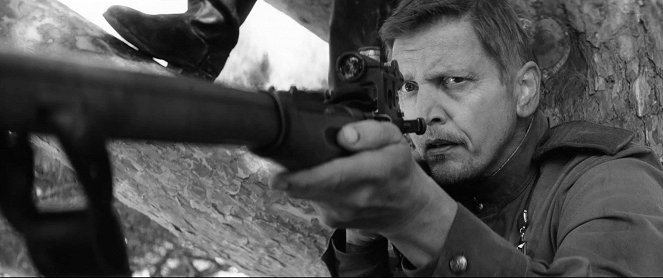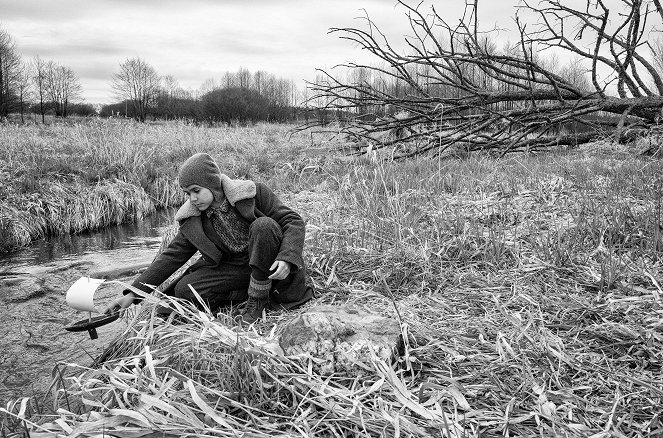Directed by:
Václav MarhoulScreenplay:
Václav MarhoulCinematography:
Vladimír SmutnýCast:
Petr Kotlár, Udo Kier, Michaela Doležalová, Zdeněk Pecha, Lech Dyblik, Jitka Čvančarová, Stellan Skarsgård, Harvey Keitel, Julian Sands (more)Plots(1)
The film follows the journey of a boy, entrusted by his Jewish parents to an elderly foster mother in an effort to escape persecution. Following a tragedy, the boy is on his own. Wandering through the desecrated countryside, the boy encounters villagers and soldiers whose own lives have been brutally altered, and who are intent on revisiting this brutality on the boy. When the war ends, the boy has been changed, forever. (Eureka Entertainment)
(more)Videos (4)
Reviews (14)
The Painted Bird is undoubtedly an ambitious filmmaking project eyeing festival awards, as evidenced by its strong theme and international cast. I welcomed the black-and-white visuals, which (as was once the case with Psycho) reduced the violence and atrocities presented by the absence of colour. I was intrigued by the episodic nature of the film, in which the young and initially innocent child protagonist meets various characters on his 'journey home' who influence, mark or corrupt him in different ways. By Czech standards, this is without question a supremely raw film featuring pervasive violence against humans and animals and an inhospitable landscape full of suffering, hopelessness and sadness. Of the individual episodes, the ones that stick out in my mind the most are those with the shameless Jitka Čvančarová, the transport of the Jews and the raid on the village. Although the film is nearly three hours long, it went by really fast in the cinema. As noted, the film lacks music alongside the colours - unless you counts the church scenes and the subtitles – which is a bit of a shame, as there is little dialogue and the music could have filled in and enhanced these quiet spots.
()
Before the premiere, I had some doubts about whether the director was capable of handling a demanding and controversial subject. He didn't embarrass himself and instead brought out the best of himself and his vision is definitely worth seeing in the movie theater, which cannot be said about the overwhelming majority of Czech films. Marhoul managed the production perfectly. A film with such a big budget and a concentration of top-notch film specialists and significant foreign actors has been missing from Czech cinema for a whole decade and will probably be missing again for many years to come. The Painted Bird does not represent a trend or a glimpse of better times - it is a solitary work that nothing can follow, and at most, it can serve as a positive example for future visionaries. Marhoul has seen a lot and is not afraid to make use of it. The great camera work by Vladimír Smutný, the black and white material, and the division of the film into chapters reference Marketa Lazarová, and Marhoul consciously build on Come and See by involving Aleksei Kravchenko; cinephiles will surely find many other references, be it to the work of Jan Němec or other classics. The problem is that, despite all his efforts, Marhoul lacks something substantial to become a world-class filmmaker. He is unable to work with the pace and rhythm of the film and he is monotonous and repetitive. My daughter, who accompanied me, admitted after the screening that she was perfectly tuned into the film in the first ten minutes, only to realize with horror that she had to endure another nearly three hours of the same thing. If the director had shortened the film by half an hour, nothing would have changed in its essence and any viewer without knowledge of the source material would not have noticed. The Painted Bird is a sequence of beautiful film images that I approvingly nod my head at, but they evoke almost no emotions in me (if they do, then it is in inappropriate places. The torture, rape, and perversion sometimes reach the point that even the famous Marquis de Sade would find erotic pleasure in them. I had fun during the scenes of the two insatiable nymphomaniacs, but otherwise, it's not what the director had in mind.) A film full of tragedy and violence should completely crush me emotionally - with Volhynia, Come and See, or Nanking, that eventually happened. Not here, though. The main character goes through hell with the same absent expression, and the viewer cannot empathize with his thinking. More dialogue is missing, as well as depth. I feel like a member of an inventory commission who checks off item after item, one shot after another, and thinks about how nicely the director, as the chairman of the commission, prepared it for him... Sometimes I pause, for example when I watch the scene of a village being massacred by collaborating Cossacks, while the Red Army is attacking them from behind. In their situation, I would have completely different worries... In my opinion, Marhoul somewhat overestimated his abilities, but I consider four stars as a fair share of encouragement that Czech cinema desperately needed. Overall impression: 70%.
()
(less)
(more)
Don't get mad at me, but this is literally a hodgepodge of random scenes in a tedious three-hour runtime. I appreciate Václav Marhoul's effort to try something new and in a way he succeeded, because in all the Czech cinematic garbage he managed to create something of quality, worldly, innovative and unconventional, but I personally don't like the result that much. Trying to make the whole point of "a good child turning evil as a result of the corruption of the world around him" is presented in a terribly skeletal way, with the boy going from village to village, encountering only evil everywhere, and the whole thing feels like 300 scenes cut from a different film each time, the shots are empty and bland, the actors barely speak, and there is no story. I really don't understand what we are supposed to take away from the film. The generation of "our parents" has no chance to put in 170 minutes of running time, the film nerds won't be shocked by the scenes, because we've seen similar things on a much crueler scale countless times before, and there's actually nothing as brutal and naturalistic as advertised. That leaves me with the last group, the film critics, but I think they're just singing odes to the film. Strange and weird, but unfortunately also boring, bland, tedious and unreflective. Some will like it, but I'd say most will have a hard time making it to the end. Unfortunately, not because of the crudeness, but just because of the insane boredom.
()
A few years ago, I couldn’t have imagined anyone having the confidence to create something so expressive, existential, full of allegory, with minimal dialogue, stunning cinematography, and performances that blend both local and international talent. And yet, here we are with The Painted Bird. It’s proof that we still have the ability to craft films of this caliber, that these kinds of cinematic masterpieces aren’t relics of the past. The Painted Bird is undoubtedly a gem of Czech cinema in the last decade—a passion project director Václav Marhoul spent years nurturing before finally bringing it to life. A project many thought was impossible to make, but here it is. The result is an unforgettable experience, albeit deeply depressing, which was likely the intention. The episodic storytelling bugged me a little, but considering the novel it’s based on, it probably couldn’t have been done any other way. With each chapter, I kept thinking, “It can’t possibly get worse,” and yet it always did in ways I couldn’t have imagined. Despite everything, The Painted Bird is a strikingly original, solid three-hour piece of filmmaking that’s far from relaxing, but offers a profound and unique experience. Marhoul amazed me years ago with Tobruk, and he’s done it again.
()
Ideally, Czech cinematography should have a big, ambitious film like this at least a couple of times a year, so one The Painted Bird wouldn’t get such an aura. But we don’t have that and with this work Marhoul is objectively several streets head of any recent Czech competition, and they simply can’t catch him. A great and stylish film, world-class. I didn’t enjoy it enough for a five-star rating because it’s not really possible to “enjoy” it. It is exhausting, rather. But a well earned four starts, without any doubt. Now, to create a media aura around this film as if it was some sort of exploitation war horror movie is incredibly absurd. Sure, there are some horrible and monstrous things, but Marhoul approaches them with a lot of decency, with chastity almost. And if the hysterical responses from Venice are anything to go by, it's just that the snobs from these big festivals like to fall into cheap headlines ... and that crap will last.
()


